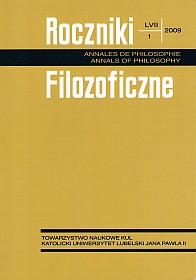Bóg, modalność, esencjalizm. Pewna wersja szkotystycznego dowodu tezy o istnieniu Boga
Abstrakt
A proof for God’s existence, inspired by Duns Scotus’s Tractatus de primo principio, is analyzed. The conclusion is based on three premises arranged in the matrix of a specific modal logic. The premises are: 1. it is possible for the world to be created by God; 2. if the world is created by God, then God exists; 3. if God exists, then God exists necessarily. In comparison to the original Scotus’s work the concept of essential order has been removed and replaced with a concept of creation. Modal expressions of the proof have been analyzed with an application of essentialism of Aristotle and Ibn Sina – the version of essentialism accepted by Scotus. Scotus’s underlying modal logic has been reconstructed and discussed in two versions: 1. as a modal logic with one pair of natural modalities; 2. as a multimodal logic with two pairs of modalities – natural and logical. The concept of natural modality is based on the essentialism discussed, the concept of logical modality is based on Scotus’s idea of non repugnantia terminorum.
Bibliografia
Bigelow J., Pargetter R.: Science and Necessity, Cambridge: Cambridge University Press 1990.
Boger G.: Aristotle’s Underlying Logic, w: Handbook of the History of Logic, red. D. M. Gabbay, J. Woods, t. 1, Amsterdam: Elsevier North Holland 2004, s. 101-246.
Cicero M. T.: De divinatione libri duo et de fato liber singularis, red. J. L. Eggenberger, Prag 1834.
Hartshorne C.: The Logic of Perfection, La Salle 1962.
Hughes G. E., Cresswell M. J.: A New Introduction to Modal Logic, London–New York: Routledge 1996 .
Jan Duns Szkot: Tractatus de primo principio, Friburgi Brisgoviae 1941.
Kuksewicz Z.: Zarys filozofii średniowiecznej. Filozofia bizantyjska, krajów zakaukaskich, słowiańska, arabska i żydowska, wyd. 2, Warszawa 1982.
Mondadori F.: Quid Sit Essentia Creature, Priusquam a Deo Producatur: Leibniz’s View, [w:] Unita e Molteplicita nel Pensiero filosofico e scientifico di Leibniz, red. A. Lamarra, R. Palaia, wyd. L. S. Olschki, Firenze 2000.
Noone T. B.: Universals and Individuation, [w:] Duns Scotus, red. T. Williams, Cambridge: Cambridge University Press 2003, s. 100-128.
Normore C. G.: Duns Scotus’s Modal Theory, [w:] Duns Scotus, red. T. Williams, Cambridge: Cambridge University Press 2003, s. 129-160.
Patterson R.: Aristotle’s Modal Logic. Essence and Entailment in the Organon, Cambridge: Cambridge University Press 1995.
Ross J. F., Bates T.: Duns Scotus on Natural Theology, [w:] Duns Scotus, red. T. Williams, Cambridge: Cambridge University Press 2003,.
Rotondo J. T.: A Commentary on The Tractatus De Primo Principio of John Duns Scotus, Rochester 1976.
Russell B.: Dlaczego nie jestem chrześcijaninem, przeł. A. Kurlandzka, [w:] T. Kotarbiński, L. Infeld, B. Russell, Religia i ja, wyd. 2, Warszawa: Książka i Wiedza 1962.
Tkaczyk M.: Niektóre osiągnięcia Szkoły Franciszkańskiej w logice formalnej, [w:] Filozofia franciszkanów, red. S. C. Napiórkowski, E. I. Zieliński, t. 3, Biblioteka Instytutu Franciszkańskiego, Niepokalanów: Wyd. OO. Franciszkanów 2005, s. 77-136.
Copyright (c) 2009 Roczniki Filozoficzne

Utwór dostępny jest na licencji Creative Commons Uznanie autorstwa – Użycie niekomercyjne – Bez utworów zależnych 4.0 Międzynarodowe.





